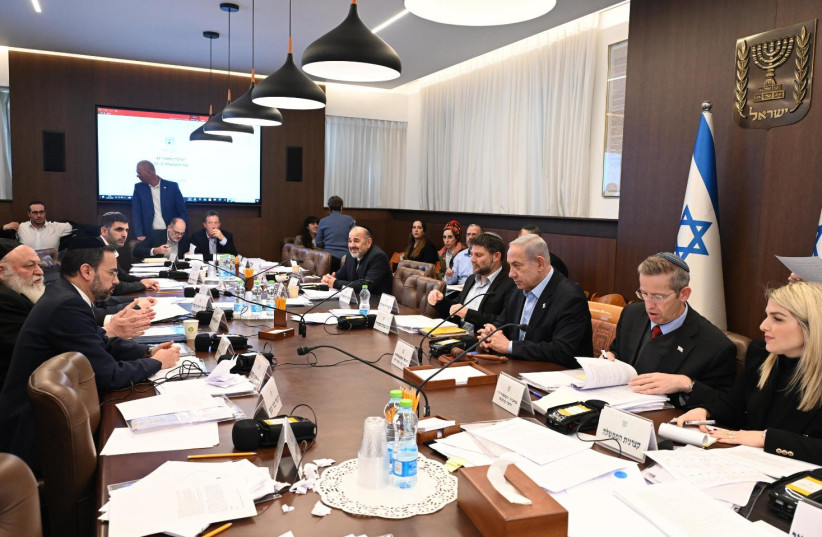The cabinet on Monday approved a proposal for the 2024 budget after negotiations that lasted nearly 24 hours. Cabinet ministers made last-minute attempts to avoid deep cuts to their offices.
The updated budget for 2024 is about NIS 582 billion, which reflects a rise of nearly NIS 70b. in government spending relative to the original budget, the Finance Ministry said in a statement. The increase includes repayment of debts connected to the war and future strengthening of the IDF, NIS 9b. to support IDF reservists and their families, funding for the public mental-health system, funding for rehabilitating the Gaza border area, and support for the hi-tech and real-estate sectors.
Ministries to cut their budget
About NIS 20b. of the rise in government spending would be funded by a budget deficit of 6.6% for 2024, the Finance Ministry said. The rest is to be funded by a cut in the budgets of all government ministries, coupled with several tax hikes, such as on bank profits, it said.
Although an initial budget proposal was published on Sunday, the changes made as a result of the overnight negotiations, which a representative for the Finance Ministry likened to a “bazaar,” were not yet available to the public, as the ministry now needs to compute and insert the changes.
The budget will now pass to the Knesset in the form of a government-sponsored bill, which will need to pass three votes in the Knesset plenum, as well as voting in the Knesset Finance Committee. The process is likely to take several weeks.
Drama in cabinet meeting
The negotiations were wrought with last-minute wrangling and political drama.

At different points during the meeting, several ministers threatened to vote against the budget after announcing that the funds their offices are to receive in the new budget were insufficient. Among them were Diaspora Affairs and Combating Antisemitism Minister Amichai Chikli (Likud), Communications Minister Shlomo Karhi (Likud), Education Minister Yoav Kisch (Likud), and National Security Minister Itamar Ben-Gvir (Otzma Yehudit).
Ben-Gvir on Monday said he had reached an agreement with the prime minister and finance minister that canceled a planned cut of nearly NIS 500 million to his office and the Israel Police and added NIS 2.275b. to “cope with the challenges of Israeli citizens’ internal security.”
Six ministers said they had opposed the budget: five ministers without portfolios from the National Unity Party and Karhi.
“The plan that was presented does not invest enough in growth engines, does not include a ‘Tkuma Directorate’ to rehabilitate the North, which should have been done long ago, and, more severely, does not reflect a fundamental shift in government priorities and ignores the heavy effects of the war,” National Unity said in a statement.
“It is still not too late to show national responsibility at this time and insert the necessary changes before the vote in the Knesset plenum,” it said.
A source in National Unity declined to say whether the party would consider leaving the government if the changes it called for were not inserted.
The opposition Yesh Atid Party said the government was a failure because it did not heed a proposal by Finance Ministry officials to shut down up to six different ministries that were of secondary importance to the war effort and that it did not completely do away with “coalition funds,” the largest chunk of which support haredi school systems.
